So from what I understand, a SIGSEGV segmentation fault is most likely caused by either trying to access memory you aren't allowed to or dereferencing a null pointer. If I am wrong in my understanding of this, please correct me as you please. As someone who is still rather new to programming, I am having trouble finding the solution to this error in this Multiplication table problem.
main.cpp:
#include <Python.h>
#include <iostream>
//#include <Windows.h>
#include <cmath>
#include <string>
using namespace std;
/*
Description:
To call this function, simply pass the function name in Python that you wish to call.
Example:
callProcedure("printsomething");
Output:
Python will print on the screen: Hello from python!
Return:
None
*/
void CallProcedure(const string& pName)
{
char *procname = new char[pName.length() + 1];
std::strcpy(procname, pName.c_str());
Py_Initialize();
PyRun_SimpleString("import sys");
PyRun_SimpleString("import os");
PyRun_SimpleString("sys.path.append(os.getcwd())");
PyObject* my_module = PyImport_ImportModule("python_modules.my_module");
PyErr_Print();
PyObject* my_function = PyObject_GetAttrString(my_module, procname);
PyObject* my_result = PyObject_CallObject(my_function, NULL);
Py_Finalize();
delete[] procname;
}
/*
Description:
To call this function, pass the name of the Python functino you wish to call and the string parameter you want to send
Example:
int x = callIntFunc("PrintMe","Test");
Output:
Python will print on the screen:
You sent me: Test
Return:
100 is returned to the C++
*/
int callIntFunc(const string& proc, const string& param)
{
char *procname = new char[proc.length() + 1];
std::strcpy(procname, proc.c_str());
char *paramval = new char[param.length() + 1];
std::strcpy(paramval, param.c_str());
PyObject *pName, *pModule, *pDict, *pFunc, *pValue = nullptr, *presult = nullptr;
// Initialize the Python Interpreter
Py_Initialize();
// Build the name object
pName = PyUnicode_FromString((char*)"python_modules.my_module");
// Load the module object
pModule = PyImport_Import(pName);
// pDict is a borrowed reference
pDict = PyModule_GetDict(pModule);
// pFunc is also a borrowed reference
pFunc = PyDict_GetItemString(pDict, procname);
if (PyCallable_Check(pFunc))
{
pValue = Py_BuildValue("(z)", paramval);
PyErr_Print();
presult = PyObject_CallObject(pFunc, pValue);
PyErr_Print();
}
else
{
PyErr_Print();
}
//printf("Result is %d\n", _PyLong_AsInt(presult));
Py_DECREF(pValue);
// Clean up
Py_DECREF(pModule);
Py_DECREF(pName);
// Finish the Python Interpreter
Py_Finalize();
// clean
delete[] procname;
delete[] paramval;
return _PyLong_AsInt(presult);
}
/*
Description:
To call this function, pass the name of the Python functino you wish to call and the string parameter you want to send
Example:
int x = callIntFunc("doublevalue",5);
Return:
25 is returned to the C++
*/
int callIntFunc(const string& proc, int param)
{
char *procname = new char[proc.length() + 1];
std::strcpy(procname, proc.c_str());
PyObject *pName, *pModule, *pDict, *pFunc, *pValue = nullptr, *presult = nullptr;
// Initialize the Python Interpreter
Py_Initialize();
// Build the name object
pName = PyUnicode_FromString((char*)"python_modules.my_module");
// Load the module object
pModule = PyImport_Import(pName);
// pDict is a borrowed reference
pDict = PyModule_GetDict(pModule);
// pFunc is also a borrowed reference
pFunc = PyDict_GetItemString(pDict, procname);
if (PyCallable_Check(pFunc))
{
pValue = Py_BuildValue("(i)", param);
PyErr_Print();
presult = PyObject_CallObject(pFunc, pValue);
PyErr_Print();
}
else
{
PyErr_Print();
}
//printf("Result is %d\n", _PyLong_AsInt(presult));
Py_DECREF(pValue);
// Clean up
Py_DECREF(pModule);
Py_DECREF(pName);
// Finish the Python Interpreter
Py_Finalize();
// clean
delete[] procname;
return _PyLong_AsInt(presult);
}
void DisplayMenuItems(bool* close) {
int choice;
int number;
int x;
cout << "1: Display a Multiplication Table" << endl;
cout << "2: Double a value" << endl;
cout << "3. Exit program" << endl;
cout << "Enter your selection as a number 1, 2, or 3." << endl;
cin >> choice;
if (choice == 1) {
cout << "Enter a number: " << endl;
cin >> number;
callIntFunc("MultiplicationTable", number);
}
else if (choice == 2) {
cout << "Enter a number: " << endl;
cin >> x;
callIntFunc("DoubleValue", x);
}
else if (choice == 3) {
cout << "Exiting program" << endl;
*close = true;
return;
}
else {
cout << "You have entered an invalid choice, please try again" << endl;
}
}
int main()
{
bool close = false;
while (!close) {
DisplayMenuItems(&close);
}
return 0;
}
The output is failing to complete the program by displaying the multiplication table and instead displays an interrupted signal as shown below:
